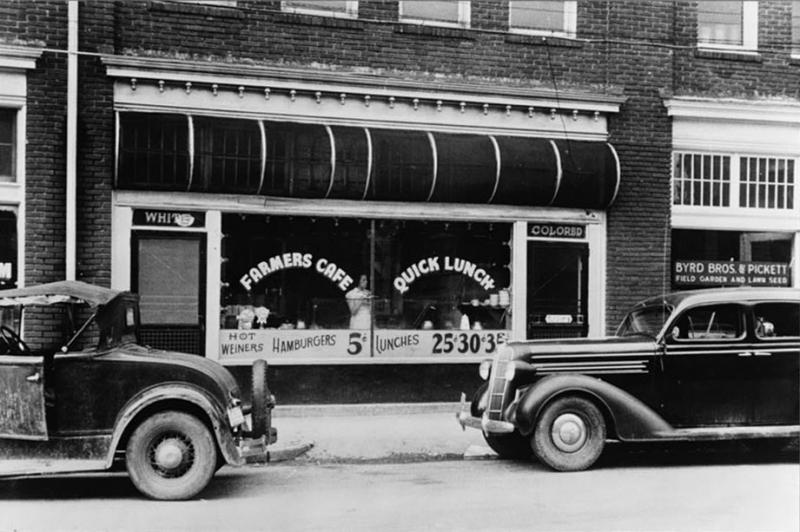A Cafe Near the Tobacco Market
A café, whose windows label it as the Farmers Cafe -- Quick Lunch, has separate entrances labeled "White" and "Colored." African Americans saw World War II as an opportunity to defeat discrimination in Europe and in the United States. In addition to segregation at home, Black soldiers and auxilaries were segregated in their military organizaitons. To combine all three sentences, although the United States was fighting for Europe's freedom from the Nazis and the National Fascist Party (Italy), African Americans were still denied their equal rights.
For more information on segregation at home in the 1940s:
PBS- https://www.pbs.org/thewar/at_home_civil_rights_minorities.htm
For more information on double victory:
Smithsonian- https://www.smithsonianmag.com/history/why-african-american-soldiers-saw...
PBS- http://www.pbs.org/wnet/african-americans-many-rivers-to-cross/history/w...
For more information on segregation within the military:
Earley, Charity Adams. One Woman's Army: A Black Officer Remembers the WAC. College Station: Texas A & M University Press, 1989

Delano, Jack. "A cafe near the tobacco market, Durham, North Carolina" Negative Nitrate. 1940. Library of Congress: Prints and Photographs Division. https://www.loc.gov/pictures/item/2017747555/ (Accessed October 26, 2018).
Public Domain
Public Domain is a copyright term that is often used when talking about copyright for creative works. Under U.S. copyright law, individual items that are in the public domain are items that are no longer protected by copyright law. This means that you do not need to request permission to re-use, re-publish or even change a copy of the item. Items enter the public domain under U.S. copyright law for a number of reasons: the original copyright may have expired; the item was created by the U.S. Federal Government or other governmental entity that views the things it creates as in the public domain; the work was never protected by copyright for some other reason related to how it was produced (for example, it was a speech that wasn't written down or recorded); or the work doesn't have enough originality to make it eligible for copyright protection.
Add a comment
PLEASE NOTE: NCpedia provides the comments feature as a way for viewers to engage with the resources. Comments are not published until reviewed by NCpedia editors at the State Library of NC, and the editors reserve the right to not publish any comment submitted that is considered inappropriate for this resource. NCpedia will not publish personal contact information in comments, questions, or responses. If you would like a reply by email, note that some email servers, such as public school accounts, are blocked from accepting messages from outside email servers or domains. If you prefer not to leave an email address, check back at your NCpedia comment for a reply. Please allow one business day for replies from NCpedia. Complete guidelines are available at https://ncpedia.org/about.